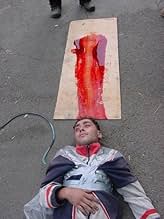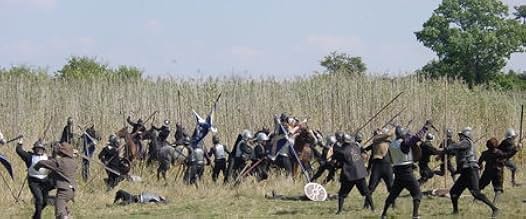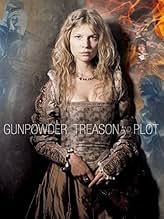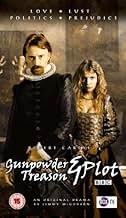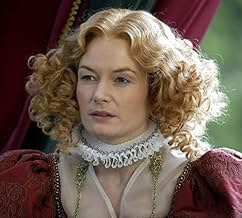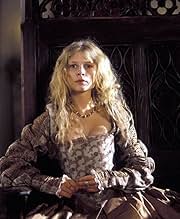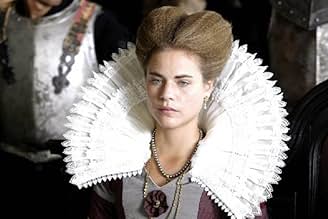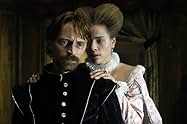Aggiungi una trama nella tua linguaMini series depicting the turbulent and bloody reigns of Scottish monarchs Mary, Queen of Scots and her son King James VI of Scotland who became King James I of England and foiled the Gunpow... Leggi tuttoMini series depicting the turbulent and bloody reigns of Scottish monarchs Mary, Queen of Scots and her son King James VI of Scotland who became King James I of England and foiled the Gunpowder Plot.Mini series depicting the turbulent and bloody reigns of Scottish monarchs Mary, Queen of Scots and her son King James VI of Scotland who became King James I of England and foiled the Gunpowder Plot.
- Premi
- 4 vittorie totali
Recensioni in evidenza
Some great performances, in particular that of Robert Carlyle as a moody, intense and utterly ruthless King James. An unrecognisable Catherine McCormack (remember Murron, William Wallace's young wife in Braveheart?) plays a scheming, all-powerful Queen Bess ("DESTROY HIM!"), whose scenes are sadly brief but memorable. Clemence Poesy, a gorgeous young French actress, gives the character of Mary a naivete and sensuality previously unseen in period pieces covering this time-frame. British audiences will recognise a now fully-grown Paul Nicholls (young Joe Wicks from Eastenders) who clearly relished his scenes playing the doomed Lord Darnley. (A possible future Bond, perhaps). Steven Duffy does well as a treacherous and highly ambitious Lord James, half-brother of Queen Mary, while Kevin McKidd lends dignity and heroism to the character of Bothwell, lover of the young Queen. Tim McInnerny is previously well-known for his comedic performances in the historical comedy Blackadder, so it was a nice change to see him as the cold, calculating Cecil, most powerful man in England.
The accuracy of certain events will no doubt be disputed by historians (the execution of Queen Mary, for example: never before have I seen it portrayed as a plot by James VI to murder his mother in order to get his own hands on the English Crown). But it is a highly enjoyable period drama whose main theme, the eternal struggle between Protestant and Catholics, is used to great effect to portray the events leading up to one of the most infamous plots in British history, commemorated every single 5th November all over these islands ever since.
Judging by the other comments some people found McGovern's style too harsh, that he belittles the both Royal family and the Protestant and Catholic branches of church, and overuses sex and violence. It's a fair criticism, but so many over-starched interpretations of British history have been made that this gritty drama becomes a breath of fresh air.
The show is evenly divided into two parts, both riveting stories. The first is the reign of Queen Mary I of Scotland, a French Catholic girl now ruling over Protestant Scotland. Clemence Poesy turns in a brilliant performance as the young queen faced with her conniving half-brother Lord James, Queen Elizabeth I of England, her misogynistic husband Lord Darnley, and her brash suitor the Lord Bothwell. The whole story is turbulent, as a state of war with the English gradually precipitates.
The second part is much higher drama, though. It is concerned with Mary's son James I, a repugnant, bitter cripple, who promises the Catholics tolerance, and then reneges on his promise at the behest of the manipulative Lord Cecil, one of the most powerful men in England. This proves the catalyst for the famous attempted bombing of the houses of parliament on November 5, lead by the ruthless Spaniard Guy Fawkes.
It is true that McGovern revolves the entire show about the us-and-them viewpoint of the Catholic and Protestant, BUT this works to great effect. Emphasising the conflict in this war really ups the ante for the drama, making for some very high-octane television. Add to this brilliant performances by Robert Carlyle, Tim McInnerny, Kevin McKidd, Sam Troughton, and Michael Fassbender (Playing Guy Fawkes as a silent Clint Eastwood type delightfully)
This is, without a doubt, the greatest telemovie I've ever seen. However, if you're at all squeamish this definitely isn't for you: this is history with the filthy bits left in for a change...
Part one featured Mary Queen of Scots taking over in Scotland 1561. The sets were disappointing but it should be noted that IRL, MQS was less than thrilled with her Scottish royal accommodations after her raising in France. Characters were believable. Complaints about actor accents in period pieces are easy to set aside because IRL English royals mostly used French anyway.
This part had very little to do with the main half, except to take the story straight to the grown-up version of what MQS worked so hard to create, James 6+1, first king of combined Brits.
Part two has a new cast and shows religious strife around 1605. Minor characters make their cases straight to the camera, relieving us of time spent with their backstories... I'll take this exposition method. We learn the events creating the Guy Faukes UK holiday. As for the odd title: "English Folk Verse: Remember, remember!
The fifth of November, The Gunpowder treason and plot; I know of no reason Why the Gunpowder treason Should ever be forgot!"
You know there is something fundamentally flawed with this "historical" production when the list of stuntmen is longer than the list of speaking parts and the songs on the soundtrack are in Romanian...
Lo sapevi?
- QuizThe title is taken from the nursery rhyme about Guy Fawkes and the Gunpowder Plot. Many versions of the rhyme exist, and its origins are unclear. But most begin with these lines: "Remember, remember / the fifth of November / the Gunpowder Treason and Plot. / I know of no reason / why the Gunpowder Treason / should ever be forgot."
- BlooperAt the beginning Mary is depicted as a young, unmarried girl who had spent 13 years in exile in France. Actually, she was a widow. She had been married to the French king who had died very young.
- Citazioni
Bothwell: Forgive me.
Mary, Queen of Scots: How's your head?
Bothwell: Sore.
Mary, Queen of Scots: I could remove it for you.
Bothwell: Well, that would do the trick, aye.
Mary, Queen of Scots: You caused Lord Darnley great offense, you called Lord Darnley a long streak of English piss!
Bothwell: Then I must apologize.
Lord Darnley: I thank you.
Bothwell: 'Twas English *pish*.
Lord Darnley: [pause] Banishment, I think.
Bothwell: Anywhere but France.
I più visti
Dettagli
- Data di uscita
- Paesi di origine
- Siti ufficiali
- Lingua
- Celebre anche come
- Conspiración, traición y muerte
- Luoghi delle riprese
- Aziende produttrici
- Vedi altri crediti dell’azienda su IMDbPro

